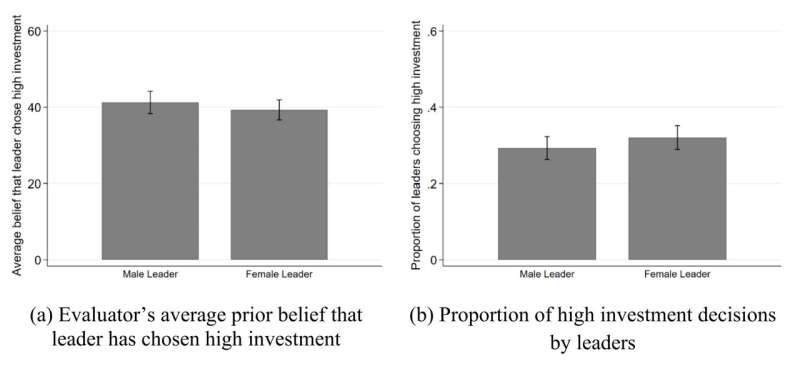This article has been reviewed according to Science X's editorial process and policies. Editors have highlighted the following attributes while ensuring the content's credibility:
fact-checked
trusted source
proofread
Study reveals how blame is attributed to male and female leaders

New research finds that female leaders are given the benefit of the doubt when they do not achieve positive results.
While those evaluating the performance of male and female leaders do not attribute positive results differently, they blame the negative outcomes of male leaders on their selfish decisions, while those of female leaders are put down to bad luck.
The study, by researchers at the University of East Anglia in the UK, and University of Melbourne and Monash University in Australia, finds that the observed gender biases in such assessments are exhibited by men, and to some extent, evaluators who act in a more prosocial manner, that is, in a way that benefits others.
In both the public and private sectors, leaders often make decisions that affect the well-being of others. For example, political leaders make policy choices that affect the welfare of their constituents. In many situations, they face a choice between maximizing their own payoffs and maximizing the payoffs of others. In these types of environments, traditional gender roles or stereotypes might imply that women may be expected to act in a more altruistic way.
In this study, published in the Journal of Economic Behavior and Organization, the researchers asked how leaders' decisions are evaluated and whether evaluators are biased in their attribution of outcomes between female and male leaders in such environments.
"Due to society's growing demand for social responsibility, those in leadership roles are under more scrutiny than ever before," said Dr. Boon Han Koh, of UEA's School of Economics and Centre for Behavioural and Experimental Social Science. "As a result, leaders across the board are expected to be aware of their impact on social welfare and engage in more prosocial activities."
"The actions of leaders are motivated by prosociality, which in turn have consequences on the welfare of group that they are leading. It is therefore important to understand whether male and female leaders are assessed differently, since the evaluations are likely to affect individuals' decision-making processes."
"We find that positive outcomes of male and female leaders are not treated differently, suggesting that men and women are deemed to be equally altruistic after being seen to achieve positive results."
"However, while the low outcomes of male leaders are blamed more on their selfish decisions, those of female leaders are attributed more to bad luck. Hence, in the case of failure, men are assigned more blame than women and perceived as being selfish."
The researchers used a laboratory setting to measure individuals' perceptions about the actions of others. They focused on a decision-making environment—the type common in many leadership settings—where the actions of leaders affected the welfare of the group they were in charge of.
The actions taken by the leaders could not be observed by the other group members, the evaluators, meaning they were judged on the outcomes they delivered. However, their gender was revealed to the rest of their group. The team found biases in the attribution of outcomes that seemed to favor women, but warn this might not be a good thing.
"One interpretation of our results is that male evaluators may see the need to treat female leaders more favorably, therefore giving them a greater benefit of the doubt in the face of failure," said Dr. Nisvan Erkal from the University of Melbourne.
"A possible explanation for this is benevolent sexism, which tends to lead to behaviors toward women that are often characterized as prosocial. It is driven by the stereotype that women need to be protected."
Prof Lata Gangadharan, of Monash University, added, "Even though biases in the attribution of negative outcomes as observed in our study seem to favor women, such biases may still lead to adverse outcomes for women.
"For example, gender biases in evaluations that favor women may hinder the development of their careers and increase the possibility of backlash against female leaders in the long run. They may also lead to distortions in the incentives provided to all decision makers in positions of power, male and female, and harm the future actions taken by them."
For the experiment 350 participants were put into groups of three, with one person randomly assigned as the leader who made a series of investment decisions on behalf of the group.
The leader faced a trade-off between choosing a costly investment which led to a positive outcome (high payoff) for the group, or a less costly investment which had a higher chance of a negative outcome (low payoff) for the group.
Therefore, the leader could either act prosocially (costly investment which increases the group's chance of getting a positive outcome), or selfishly (less costly investment which increases the group's chance of getting a negative outcome).
The research is published in the SSRN Electronic Journal.
More information: Nisvan Erkal et al, Do Women Receive Less Blame Than Men? Attribution of Outcomes in a Prosocial Setting, SSRN Electronic Journal (2022). DOI: 10.2139/ssrn.4143384
Provided by University of East Anglia





















